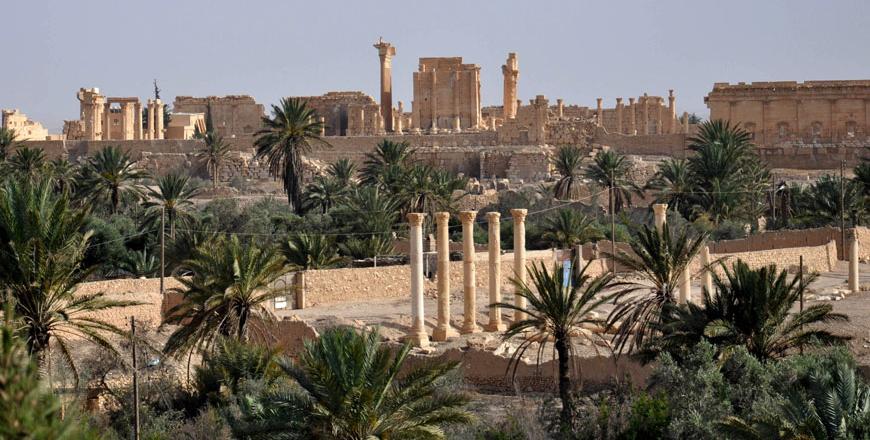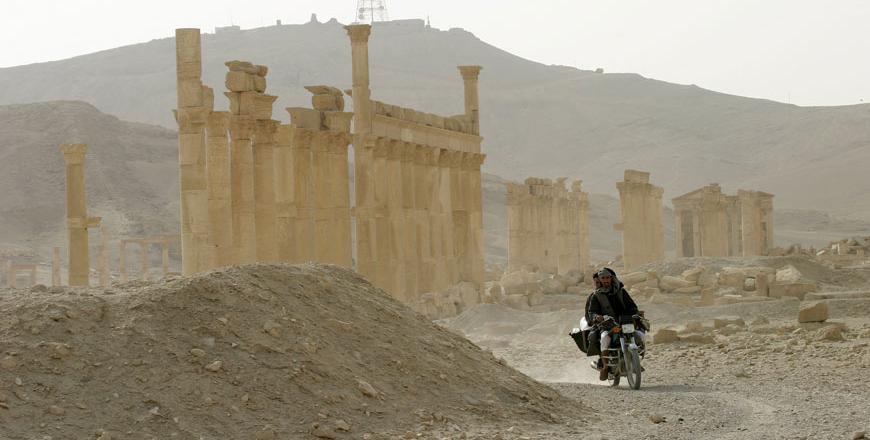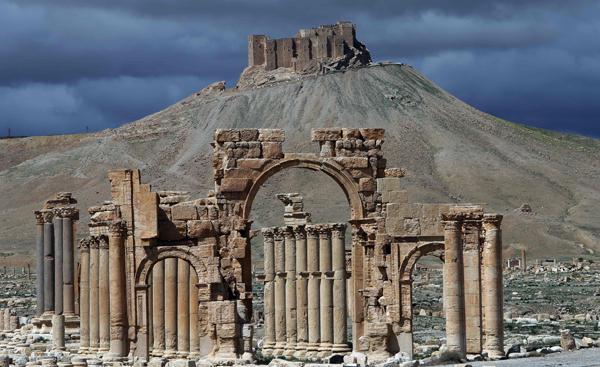You are here
Syria forces retake ancient Palmyra in major victory over Daesh
By AFP - Mar 28,2016 - Last updated at Mar 28,2016

A member of the Syrian government forces sits by a sign post on the outskirts of the ancient city of Palmyra, after they recaptured the UNESCO world heritage site from the Daesh terror group on Sunday (AFP photo)
PALMYRA, Syria — Syrian troops recaptured the ancient city of Palmyra from the Daesh terror group on Sunday and pledged to build on the win with an advance against other militant strongholds.
President Bashar Al Assad hailed the victory as an "important achievement" as his Russian counterpart and key backer Vladimir Putin congratulated Damascus for retaking the UNESCO world heritage site.
An AFP correspondent inside Palmyra said monuments destroyed by the militants — like the iconic Temple of Bel — were in pieces but that much of the ancient city was intact.
Residential neighbourhoods in the adjacent modern town were deserted and damage was widespread, the correspondent said.
A group of regime fighters took time off to celebrate their win and kicked around a football in the middle of a street strewn with debris.
The militants sparked a global outcry after seizing Palmyra in May 2015 and setting about destroying some of its treasured monuments.
But Syria's antiquities chief on Sunday said the city's priceless artefacts were in much better shape than feared.
“We were expecting the worst. But the landscape, in general, is in good shape,” Maamun Abdulkarim told AFP from Damascus.
“We could have completely lost Palmyra... The joy I feel is indescribable.”
The Syrian army said that Sunday’s victory meant the city would now serve as a base to “broaden operations” against Daesh, including in its stronghold of Raqqa and Deir Ezzor further east.
Backed by a barrage of Russian air strikes, Syrian troops and allied militia launched a major offensive to retake Palmyra this month.
The city is both a symbolic and strategic prize for Assad’s forces, as it provides control of the surrounding desert extending all the way to the Iraqi border.
At least 400 Daesh militants were killed in the battle for the city, the Syrian Observatory for Human Rights said. On the government side, 188 troops and militiamen were killed.
“That’s the heaviest losses that Daesh has sustained in a single battle since its creation” in 2013, the director of the Britain-based monitoring group, Rami Abdel Rahman, told AFP.
He said two cars packed with explosives blew up in the afternoon, one west of Palmyra and the other northeast of the city.
Militants under pressure
After seizing Palmyra last year, Daesh blew up two of the site’s treasured temples, its triumphal arch and a dozen tower tombs, in a campaign of destruction that UNESCO described as a war crime.
The extremists used Palmyra’s ancient theatre as a venue for public executions and also murdered the city’s 82-year-old former antiquities chief.
A military source told AFP on Sunday that Daesh militants had retreated towards the east as the army made its final push.
Army sappers defused roadside mines in both the modern part of the city and in the old ruins.
Syrian state television broadcast footage from inside Palmyra’s famed museum, showing jagged pieces of sculptures on the ground and blanketed in dust.
Daesh, behind a string of attacks in the West including last week’s Brussels bombings, is under growing pressure from Syrian and Iraqi forces determined to retake bastions of its self-proclaimed “caliphate”.
On Thursday, the Iraqi army announced the launch of an offensive to eventually recapture second city Mosul, held by the extremist since June 2014.
United Nations chief Ban Ki-moon told reporters in neighbouring Jordan that he was “encouraged” by the recapture of Palmyra.
Palmyra ‘will return’
Russian forces, which intervened in support of longtime ally Assad last September, were heavily involved in the Palmyra offensive despite a major drawdown last week.
Russian warplanes carried out 40 combat sorties around Palmyra in the last 24 hours, striking 117 “terrorist targets” and killing 80 Daesh militants, Moscow’s defence ministry said on Sunday.
Putin telephoned Assad to congratulate the Syrian leader, adding that “successes such as the liberation of Palmyra would be impossible without Russia’s support,” a Kremlin spokesman said.
Assad said the victory was “fresh proof of the efficiency of the Syrian army and its allies in fighting terrorism”.
Daesh and its rival, Al Qaeda-affiliated Al Nusra Front, are not party to a landmark ceasefire in Syria since February 27.
The month-long truce has brought relative quiet to many areas across Syria, where more than 270,000 have been killed and millions had fled their homes in the last five years.
Palmyra, northeast of Damascus, drew some 150,000 tourists a year before Syria’s civil war and is known to Syrians as the “Pearl of the Desert”.
Syrian officials, including antiquities chief Abdulkarim, have vowed to rebuild the ancient monuments.
“Palmyra will return to the way it was,” he said.
Related Articles
DAMASCUS — The Syrian army has reopened a key oil supply route near Daesh-controlled Palmyra, as the hardline militant group has mined the c
BEIRUT — Satellite images have confirmed the destruction of the Temple of Bel, which was one of the best preserved Roman-era sites in the Sy
BEIRUT — Syrian soldiers and their allies advanced to within 1km of Palmyra on Thursday and soldiers speaking from the outskirts of the hist



















